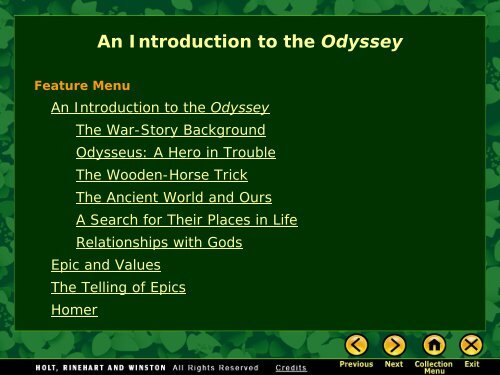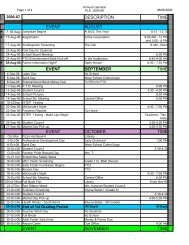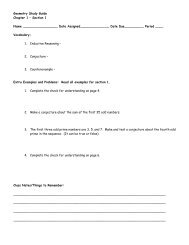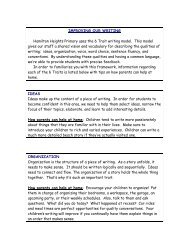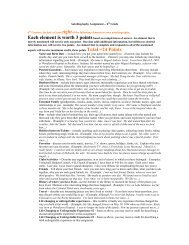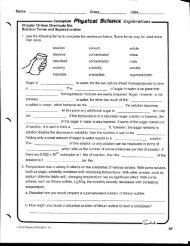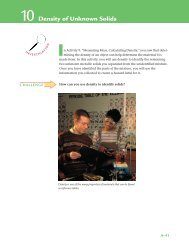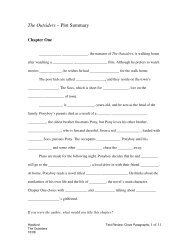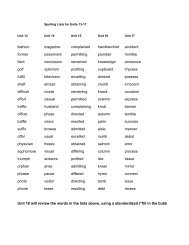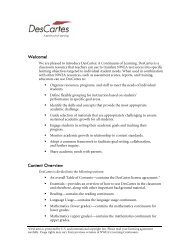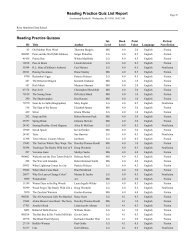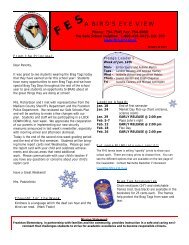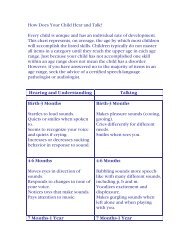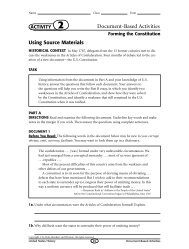An Introduction to the Odyssey - EZWebSite
An Introduction to the Odyssey - EZWebSite
An Introduction to the Odyssey - EZWebSite
Create successful ePaper yourself
Turn your PDF publications into a flip-book with our unique Google optimized e-Paper software.
<strong>An</strong> <strong>Introduction</strong> <strong>to</strong> <strong>the</strong> <strong>Odyssey</strong><br />
Feature Menu<br />
<strong>An</strong> <strong>Introduction</strong> <strong>to</strong> <strong>the</strong> <strong>Odyssey</strong><br />
The War-S<strong>to</strong>ry Background<br />
Odysseus: A Hero in Trouble<br />
The Wooden-Horse Trick<br />
The <strong>An</strong>cient World and Ours<br />
A Search for Their Places in Life<br />
Relationships with Gods<br />
Epic and Values<br />
The Telling of Epics<br />
Homer
<strong>An</strong> <strong>Introduction</strong> <strong>to</strong> <strong>the</strong> <strong>Odyssey</strong><br />
“Sing in me, Muse, and through me tell <strong>the</strong> s<strong>to</strong>ry<br />
of that man skilled in all ways of contending, . . .”
<strong>An</strong> <strong>Introduction</strong> <strong>to</strong> <strong>the</strong> <strong>Odyssey</strong><br />
The <strong>Odyssey</strong> is a tale of a hero’s long and perilous<br />
journey home.<br />
But, it is also <strong>the</strong> s<strong>to</strong>ry of a son in need of his<br />
fa<strong>the</strong>r and of a faithful wife waiting for her<br />
husband’s return.<br />
[End of Section]
The War-S<strong>to</strong>ry Background<br />
The Iliad provides <strong>the</strong> background for Odysseus’s<br />
s<strong>to</strong>ry and tells <strong>the</strong> tale of a ten-year war fought<br />
outside <strong>the</strong> walls of Troy. In Homer’s Iliad<br />
• <strong>the</strong> Trojan War is in its tenth and final year<br />
• <strong>the</strong> people of Troy are fighting an alliance of<br />
Greek kings because <strong>the</strong> world’s most beautiful<br />
woman, Helen, abandoned her husband,<br />
Menelaus (a Greek king) and ran off with Paris,<br />
a prince of Troy
The War-S<strong>to</strong>ry Background<br />
The Iliad provides <strong>the</strong> background for Odysseus’s<br />
s<strong>to</strong>ry and tells <strong>the</strong> tale of a ten-year war fought<br />
outside <strong>the</strong> walls of Troy. In Homer’s Iliad<br />
• <strong>the</strong> Greeks won <strong>the</strong> war, reduced <strong>the</strong> city of<br />
Troy <strong>to</strong> smoldering ruins, and butchered all <strong>the</strong><br />
inhabitants, except for those <strong>the</strong>y <strong>to</strong>ok as<br />
slaves back <strong>to</strong> Greece<br />
[End of Section]
Odysseus: A Hero in Trouble<br />
Odysseus is not a typical epic hero. He is faced<br />
with<br />
• difficult choices<br />
• post-war disillusionment<br />
• disrespect from <strong>the</strong><br />
people of his homeland
Odysseus: A Hero in Trouble<br />
Before <strong>the</strong> Trojan War, Odysseus<br />
• married <strong>the</strong> beautiful and<br />
faithful Penelope<br />
• had one son, Telemachus
Odysseus: A Hero in Trouble<br />
When called <strong>to</strong> serve in <strong>the</strong> Trojan War, Odysseus<br />
• pretended <strong>to</strong> be insane so<br />
he wouldn’t have <strong>to</strong> go (he<br />
dressed as a peasant,<br />
plowed his field, and<br />
sowed it with salt)<br />
• revealed his sanity <strong>to</strong><br />
save his son’s life (who<br />
was placed in front of <strong>the</strong><br />
plow)<br />
[End of Section]
The Wooden-Horse Trick<br />
During <strong>the</strong> Trojan War, Odysseus<br />
• performed extremely well as a soldier and<br />
commander<br />
• thought of <strong>the</strong> famous wooden-horse trick that<br />
lead <strong>to</strong> <strong>the</strong> defeat of Troy
The Wooden-Horse Trick<br />
• Odysseus’s plan was <strong>to</strong> build an enormous<br />
wooden horse and hide Greek soldiers inside.<br />
• The horse was left outside <strong>the</strong> gates of Troy,<br />
and <strong>the</strong> Greeks “abandoned” <strong>the</strong>ir camp.
The Wooden-Horse Trick<br />
• The Trojans thought <strong>the</strong> horse was a peace<br />
offering and brought it in<strong>to</strong> <strong>the</strong> walled city.<br />
• At night, <strong>the</strong> men hidden in <strong>the</strong> horse came out<br />
and opened <strong>the</strong> gates <strong>to</strong> <strong>the</strong> entire Greek army.<br />
[End of Section]
The <strong>An</strong>cient World and Ours<br />
• Odysseus’s world is harsh, violent, and<br />
primitive.<br />
• The “palaces” that he and his men raid might<br />
have been nothing more than mud and s<strong>to</strong>ne<br />
farmhouses.<br />
• The “worldly goods” <strong>the</strong>y carry off from <strong>to</strong>wn<br />
might have been only pots and pans, cattle and<br />
sheep.<br />
[End of Section]
A Search for Their Places in Life<br />
The Theme of <strong>the</strong> <strong>Odyssey</strong><br />
Odysseus and his family are searching for<br />
• <strong>the</strong> right relationships with one ano<strong>the</strong>r and <strong>the</strong><br />
people around <strong>the</strong>m<br />
• <strong>the</strong>ir proper places in life
A Search for Their Places in Life<br />
The Structure of <strong>the</strong> <strong>Odyssey</strong><br />
The s<strong>to</strong>ry begins with Telemachus, Odysseus’s<br />
son. Telemachus is searching for his fa<strong>the</strong>r<br />
because he<br />
• is being threatened by rude, powerful men who<br />
want <strong>to</strong> marry his mo<strong>the</strong>r and rob Telemachus<br />
of his inheritance<br />
• needs his fa<strong>the</strong>r <strong>to</strong> return home and res<strong>to</strong>re<br />
order
A Search for Their Places in Life<br />
The Structure of <strong>the</strong> <strong>Odyssey</strong><br />
Readers learn that Odysseus<br />
• is stranded on an island, longing <strong>to</strong> get home<br />
• has been gone for twenty years—he has spent<br />
ten years at war and ten years trying <strong>to</strong> get<br />
home<br />
• is in <strong>the</strong> middle of a midlife crisis and searching<br />
for inner peace<br />
[End of Section]
Relationships with Gods<br />
In Homer’s s<strong>to</strong>ries, a god can be an alter ego—a<br />
reflection of a hero’s best or worst qualities.<br />
• Odysseus is known for his<br />
mental abilities, so he<br />
receives aid from A<strong>the</strong>na, <strong>the</strong><br />
goddess of wisdom.<br />
• Odysseus can also be cruel<br />
and violent. Odysseus’s<br />
nemesis is Poseidon, <strong>the</strong> god<br />
of <strong>the</strong> sea, who is known for<br />
arrogance and brutishness.
Relationships with Gods<br />
Myths in <strong>the</strong> <strong>Odyssey</strong><br />
Greek myths plays an important role in <strong>the</strong><br />
<strong>Odyssey</strong>.<br />
• Homer is concerned with <strong>the</strong> relationship<br />
between human and gods.<br />
• For Homer, <strong>the</strong> gods control all things, including<br />
Odysseus’s fate.<br />
[End of Section]
Epics and Values<br />
Epics are long narrative poems that tell of <strong>the</strong><br />
adventures of heroes who in some way embody<br />
<strong>the</strong> values of <strong>the</strong>ir civilization.<br />
• The Greeks used Homer’s epics, <strong>the</strong> Iliad and<br />
<strong>the</strong> <strong>Odyssey</strong>, <strong>to</strong> teach Greek virtues.<br />
More about Epics
Epics and Values<br />
The Epic Tradition<br />
All epic poems in <strong>the</strong> western world owe<br />
something <strong>to</strong> <strong>the</strong> basic patterns established in<br />
Homer’s epics.<br />
• The Iliad is <strong>the</strong> primary<br />
model for an epic of war.<br />
• The <strong>Odyssey</strong> is <strong>the</strong> model<br />
for an epic of <strong>the</strong> long<br />
journey.<br />
[End of Section]
The Telling of Epics<br />
Epics and o<strong>the</strong>r tales were<br />
probably <strong>to</strong>ld by wandering<br />
bards or minstrels called<br />
rhapsodes. Rhapsodes were<br />
• <strong>the</strong> his<strong>to</strong>rians, entertainers,<br />
and mythmakers of <strong>the</strong>ir time<br />
• responsible for spreading<br />
news about recent events or<br />
<strong>the</strong> doings of heroes, gods,<br />
and goddesses
The Telling of Epics<br />
Epics were originally <strong>to</strong>ld aloud.<br />
• They followed basic s<strong>to</strong>ry lines and incorporated<br />
formulaic descriptions.<br />
• Most of <strong>the</strong> words were improvised <strong>to</strong> fit a<br />
particular rhythm or meter.<br />
• Epics included Homeric, or epic, similes that<br />
compare heroic events <strong>to</strong> easily understandable<br />
everyday events.
The Telling of Epics<br />
Epics such as <strong>the</strong> Iliad and <strong>Odyssey</strong> were probably<br />
<strong>to</strong>ld over a period of several days.<br />
• Singers might have summarized part of <strong>the</strong><br />
tales, depending on how long <strong>the</strong>y stayed in<br />
one community.<br />
[End of Section]
Homer<br />
No one knows for sure who Homer was.<br />
• Later Greeks believed he was a blind minstrel,<br />
or singer, from <strong>the</strong> island of Chios.<br />
• One scholar suggests Homer<br />
was a woman because home<br />
and hearth played such an<br />
important role in his s<strong>to</strong>ries.<br />
• Some scholar think <strong>the</strong>re were<br />
two Homers. Some think he was<br />
just a legend.<br />
[End of Section]
The End


